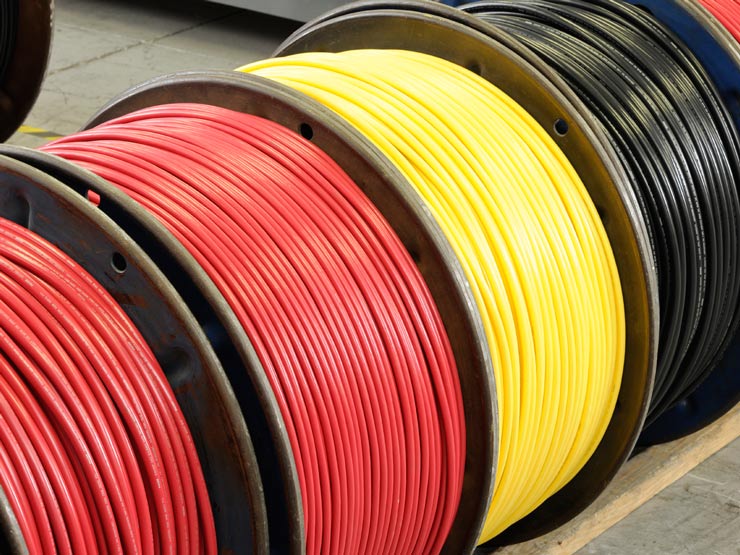Why Use Marine Optimized Cable?
Posted by Pacer on 21st Jul 2025

The open water is an unforgiving environment. A place where vibration, elemental exposure, and chemical reactions batter anything out there. From the salt in the water to the constant UV exposure, the open water is undoubtedly one of the harshest environmental conditions on Earth. This is why protection is essential. Not just the hull and outer surfaces, but the internal components as well. This is especially true when dealing with something like an electrical system. This is where marine-optimized cable comes in.
“From the salt in the water to the constant UV exposure, the open water is undoubtedly one of the harshest environmental conditions on Earth.”
What makes marine-optimized cable advantageous?
Marine cable is built from tinned copper. Tinning offers a range of benefits that you will not get from cables designed for shore use. The biggest benefit that tinned copper offers is corrosion resistance. Copper oxidizes rapidly, and as it does, it loses its current-carrying capabilities. By tinning the copper, the oxidation is greatly reduced. To learn more about the difference between tinned copper and bare copper, click here. Marine-optimized cable also carries a pliable, highly flexible, durable PVC jacket. This flexibility is essential when running wires through tight spaces such as boat hulls. Pacer created a proprietary insulation that is unsurpassed in the marine industry. The high conductivity, resistance to corrosion, and extreme flexibility come together to create a cable that can tackle the worst punishment open water has to offer.
![]()
Tinned Copper

High Conductivity
![]()
Highly Flexible
Why use marine-optimized cable?

When it comes to marine-optimized cable, it must be able to survive in the harsh marine environment for long periods of time. Mistakenly using another type of cable, such as automotive cable, will have detrimental effects.
For starters, using the wrong type of cable would leave your electrical connections more susceptible to corrosion. By using a cable designed for something like automotive use on your boat, you do not have the added protection you would get from tinned marine cable. This leaves your cables subject to oxidation, which can and will eventually lead to failure.
Another issue is that if the cable is not marine-optimized, then it will not have the high level of resistance needed for the marine environment. You always want to be sure to use the proper cable for the job. Other cables also carry an insulation that is not built for flexibility and vibration resistance. This will eventually lead to cracking of the insulation, which will let moisture in. Without the tinning we talked about before, these cracks will lead to more corrosion. This is why it is essential to only use marine-optimized cable on your boat.
What sets Pacer Marine-Optimized Cable apart?
When Pacer designed the manufacturing process for their marine cable, they took all of the above factors and more into consideration. Pacer is run by three generations of boating enthusiasts. It is this passion that led to the development of Pacer marine-optimized cable. By having a deep understanding of the marine industry and the marine environment, Pacer has created products that have propelled them to become an industry leader.

Pacer marine-optimized cable has everything we’ve discussed so far and has taken it to the next level. The high-quality copper cable is tinned, but not just in regular everyday tin, rather in high-quality tin. The proprietary insulation is from virgin PVC, never regrind, and is designed for easy installation, flexibility, and ease of routing. The insulation is added to the wire through an extrusion process that leaves absolutely no room for moisture to accumulate. This guarantees that the cable will last much longer than the competition's. Even the print on the cable is designed in such a way as to make identification easier. Basically, when you see PACER on your cable, you know that you have the highest level of quality available. Our cable works with nearly any electrical connector type, such as crimp connectors. The types of crimp connectors include a vast array of styles.
![]()
Proprietary Insulation
![]()
Ease of Installation
![]()
High-Quality Tin
What resistances does Pacer marine cable have?
![]()
Pacer marine-optimized cable exceeds many of the specifications set forth by the marine industry. Many cables are resistant to moisture and oil, but Pacer took it a step further. In this way, we have raised the bar to create superior marine cable built to handle the toughest environments. Pacer marine cable is resistant to oil, moisture, flame, gasoline, acid, alkali, and abrasion. These resistances, coupled with its high-quality design, make it the ideal choice for the marine environment. Our cable works well with electrical wire connectors. Using any other cable in your boat is just settling for less.
